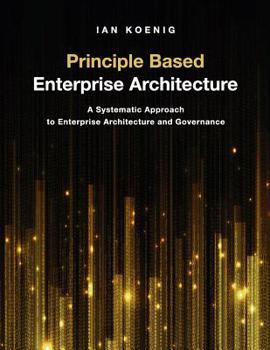Principle Based Enterprise Architecture: A Systematic Approach to Enterprise Architecture and Governance
The Principle Based Enterprise Architecture (PBEA) Method is a proven approach for implementing an enterprise-wide architecture practice in large- and medium-sized technology organizations.
The method begins with a set of architecture objectives linked to concepts that matter to the business. It then lays out how to build technology platforms from components we call assets and how to manage those assets over time, through the calculation and management of technical debt.
The PBEA method is a pragmatic approach to enterprise technology architecture which is based on the fundamental tenet that technology is never perfect, compromises must be made, and one of the most valuable functions an enterprise architecture group can provide for a company is a method for managing those compromises. We call the cost of these compromises "technical debt". It is essentially the difference between what we should have spent on technology and what we did spend.
The PBEA method grew from the experience of watching how large technology organizations function (or do not function as the case may be).
You will learn about such essential topics as:
Best practices for building, managing, and ultimately evolving an enterprise architecture. Defining principles and golden rules to guide the high-quality creation of the building blocks of products and platforms (assets). Calculating technical debt and assessing the business risk associated with carrying that debt. Identifying and managing the actions required to pay off technical debt and mitigate any associated business risk.If you have witnessed products and platforms 'collapsing under the burden of technical debt', then this book is for you. If you have seen technology organizations fail to learn from their mistakes, then this book is also for you. If you have been involved in the development of products where Version 2 required almost a rewrite of Version 1 or worked in technology organizations that spend an excessive portion of their budget on maintenance, then the PBEA method may provide both insight and benefit. Or if you are an enterprise architect and have witnessed one or more Enterprise Architecture functions get eliminated because they were seen as 'too ivory tower' and too distant from the customer, then this book will provide you with a concrete, fact-based approach for building an enterprise architecture function that is fully aligned with business objectives and that delivers real measurable benefit to the corporation.





